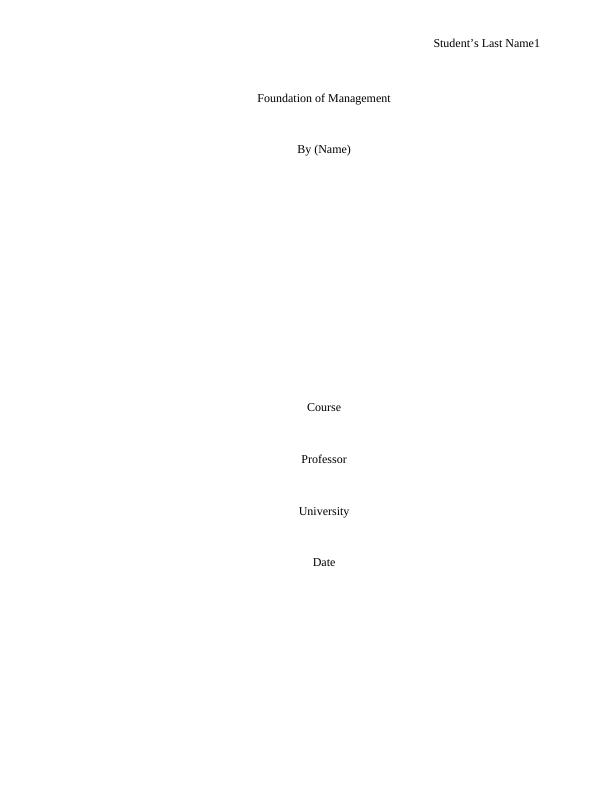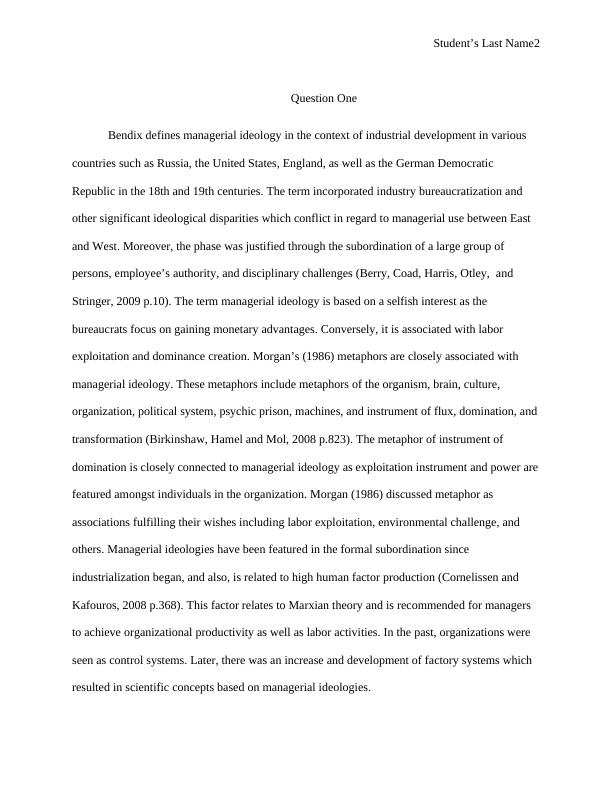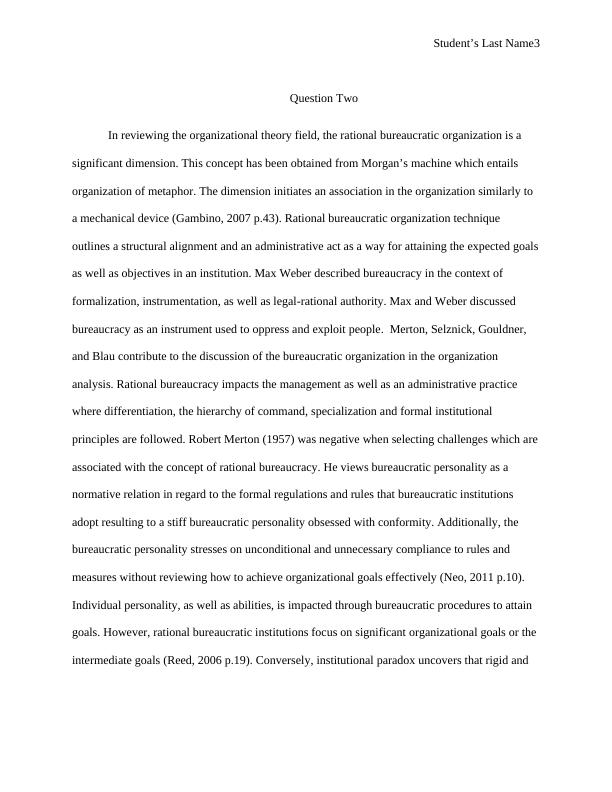Organizational Theory and Management Ideologies
Added on 2023-06-13
7 Pages1721 Words345 Views
Student’s Last Name1
Foundation of Management
By (Name)
Course
Professor
University
Date
Foundation of Management
By (Name)
Course
Professor
University
Date

Student’s Last Name2
Question One
Bendix defines managerial ideology in the context of industrial development in various
countries such as Russia, the United States, England, as well as the German Democratic
Republic in the 18th and 19th centuries. The term incorporated industry bureaucratization and
other significant ideological disparities which conflict in regard to managerial use between East
and West. Moreover, the phase was justified through the subordination of a large group of
persons, employee’s authority, and disciplinary challenges (Berry, Coad, Harris, Otley, and
Stringer, 2009 p.10). The term managerial ideology is based on a selfish interest as the
bureaucrats focus on gaining monetary advantages. Conversely, it is associated with labor
exploitation and dominance creation. Morgan’s (1986) metaphors are closely associated with
managerial ideology. These metaphors include metaphors of the organism, brain, culture,
organization, political system, psychic prison, machines, and instrument of flux, domination, and
transformation (Birkinshaw, Hamel and Mol, 2008 p.823). The metaphor of instrument of
domination is closely connected to managerial ideology as exploitation instrument and power are
featured amongst individuals in the organization. Morgan (1986) discussed metaphor as
associations fulfilling their wishes including labor exploitation, environmental challenge, and
others. Managerial ideologies have been featured in the formal subordination since
industrialization began, and also, is related to high human factor production (Cornelissen and
Kafouros, 2008 p.368). This factor relates to Marxian theory and is recommended for managers
to achieve organizational productivity as well as labor activities. In the past, organizations were
seen as control systems. Later, there was an increase and development of factory systems which
resulted in scientific concepts based on managerial ideologies.
Question One
Bendix defines managerial ideology in the context of industrial development in various
countries such as Russia, the United States, England, as well as the German Democratic
Republic in the 18th and 19th centuries. The term incorporated industry bureaucratization and
other significant ideological disparities which conflict in regard to managerial use between East
and West. Moreover, the phase was justified through the subordination of a large group of
persons, employee’s authority, and disciplinary challenges (Berry, Coad, Harris, Otley, and
Stringer, 2009 p.10). The term managerial ideology is based on a selfish interest as the
bureaucrats focus on gaining monetary advantages. Conversely, it is associated with labor
exploitation and dominance creation. Morgan’s (1986) metaphors are closely associated with
managerial ideology. These metaphors include metaphors of the organism, brain, culture,
organization, political system, psychic prison, machines, and instrument of flux, domination, and
transformation (Birkinshaw, Hamel and Mol, 2008 p.823). The metaphor of instrument of
domination is closely connected to managerial ideology as exploitation instrument and power are
featured amongst individuals in the organization. Morgan (1986) discussed metaphor as
associations fulfilling their wishes including labor exploitation, environmental challenge, and
others. Managerial ideologies have been featured in the formal subordination since
industrialization began, and also, is related to high human factor production (Cornelissen and
Kafouros, 2008 p.368). This factor relates to Marxian theory and is recommended for managers
to achieve organizational productivity as well as labor activities. In the past, organizations were
seen as control systems. Later, there was an increase and development of factory systems which
resulted in scientific concepts based on managerial ideologies.

Student’s Last Name3
Question Two
In reviewing the organizational theory field, the rational bureaucratic organization is a
significant dimension. This concept has been obtained from Morgan’s machine which entails
organization of metaphor. The dimension initiates an association in the organization similarly to
a mechanical device (Gambino, 2007 p.43). Rational bureaucratic organization technique
outlines a structural alignment and an administrative act as a way for attaining the expected goals
as well as objectives in an institution. Max Weber described bureaucracy in the context of
formalization, instrumentation, as well as legal-rational authority. Max and Weber discussed
bureaucracy as an instrument used to oppress and exploit people. Merton, Selznick, Gouldner,
and Blau contribute to the discussion of the bureaucratic organization in the organization
analysis. Rational bureaucracy impacts the management as well as an administrative practice
where differentiation, the hierarchy of command, specialization and formal institutional
principles are followed. Robert Merton (1957) was negative when selecting challenges which are
associated with the concept of rational bureaucracy. He views bureaucratic personality as a
normative relation in regard to the formal regulations and rules that bureaucratic institutions
adopt resulting to a stiff bureaucratic personality obsessed with conformity. Additionally, the
bureaucratic personality stresses on unconditional and unnecessary compliance to rules and
measures without reviewing how to achieve organizational goals effectively (Neo, 2011 p.10).
Individual personality, as well as abilities, is impacted through bureaucratic procedures to attain
goals. However, rational bureaucratic institutions focus on significant organizational goals or the
intermediate goals (Reed, 2006 p.19). Conversely, institutional paradox uncovers that rigid and
Question Two
In reviewing the organizational theory field, the rational bureaucratic organization is a
significant dimension. This concept has been obtained from Morgan’s machine which entails
organization of metaphor. The dimension initiates an association in the organization similarly to
a mechanical device (Gambino, 2007 p.43). Rational bureaucratic organization technique
outlines a structural alignment and an administrative act as a way for attaining the expected goals
as well as objectives in an institution. Max Weber described bureaucracy in the context of
formalization, instrumentation, as well as legal-rational authority. Max and Weber discussed
bureaucracy as an instrument used to oppress and exploit people. Merton, Selznick, Gouldner,
and Blau contribute to the discussion of the bureaucratic organization in the organization
analysis. Rational bureaucracy impacts the management as well as an administrative practice
where differentiation, the hierarchy of command, specialization and formal institutional
principles are followed. Robert Merton (1957) was negative when selecting challenges which are
associated with the concept of rational bureaucracy. He views bureaucratic personality as a
normative relation in regard to the formal regulations and rules that bureaucratic institutions
adopt resulting to a stiff bureaucratic personality obsessed with conformity. Additionally, the
bureaucratic personality stresses on unconditional and unnecessary compliance to rules and
measures without reviewing how to achieve organizational goals effectively (Neo, 2011 p.10).
Individual personality, as well as abilities, is impacted through bureaucratic procedures to attain
goals. However, rational bureaucratic institutions focus on significant organizational goals or the
intermediate goals (Reed, 2006 p.19). Conversely, institutional paradox uncovers that rigid and

End of preview
Want to access all the pages? Upload your documents or become a member.
